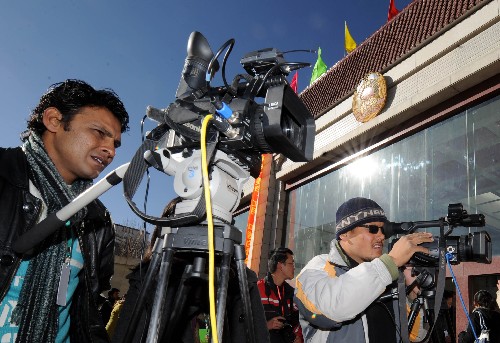Foreign correspondents not targeted: analysts

Foreign correspondents' associations have voiced their concern over a series of harassment and beating cases in China in the past two months. Experts pointed out that foreign journalists are not necessarily being targeted, but called on local authorities to improve their skill in dealing with the media.
The Foreign Correspondent's Clubs of Beijing, Shanghai and Hong Kong Tuesday cited four recent cases, including the alleged beating of a journalist from Japan's Asahi Shimbun by police in Nantong, Jiangsu Province during coverage of a demonstration in July.
"I was photographing scenes of dozens of police beating protesters, then I was targeted by men in blue uniforms and got beaten," Atsushi Okudera, a Shanghai-based reporter with Asahi Shimbun, told the Global Times on Tuesday, adding that his camera was taken and had still not been returned.
An official surnamed Pan with the Nantong Foreign Affairs office told the Global Times that local police are still investigating the case and will try to deliver the result by the end of this month.
"We want to deliver a convincing result and will follow the law. But we'll also protect our rights if the government is slandered," Pan said on Tuesday.
Other incidents occurred in August, including an assault on a Hong Kong-based Asia Television reporter outside the court in Anhui, where Bogu Kailai, wife of Bo Xilai, stood trial for murder, a German television reporter being attacked by a mob and detained for nine hours in Henan, and two reporters from Poland and the US being followed and intimidated in Inner Mongolia.
"We are particularly concerned that a number of these incidents have involved members of the official security forces and associated elements," the statement wrote.
Foreign reporters had greater access to information in China after the 2008 Beijing Olympics, but it is still hard for them to get solid and useful information from some institutions that believe foreign reporters pursue their own political agendas.
Zhang Zhi'an, an associate professor with the School of Communication and Design at Sun Yat-Sen University, told the Global Times that the cases are different in nature but not specially targeting foreign reporters.
"When reporting on sensitive issues in China, it is hard for both foreign and domestic journalists to get information, because under pressure to protect local officials' interests, local governments may not act in line with the central government," Zhang said.
Many Chinese reporters have experienced being bullied or abused by people who feared their secrets being exposed or who simply misread the reporters' intentions.
Lu Haitao, a photographer at the Shanghai-based Oriental Morning Post, said Chinese journalists often face a worse situation than their foreign counterparts in China, especially when covering local news, as local authorities are not worried about diplomatic repercussions when roughing up Chinese reporters.
"Shanghai has learned to treat reporters better, but in other cities, the conditions are less desirable and I've been followed and intimidated during coverage of mine accidents and beaten by bad-tempered citizens," Lu said. He called on local authorities to provide more help and show more respect for the law.
Professor Zhang said local governments should learn to work better with foreign journalists since coverage of China by foreign press will inevitably grow in the foreseeable future.